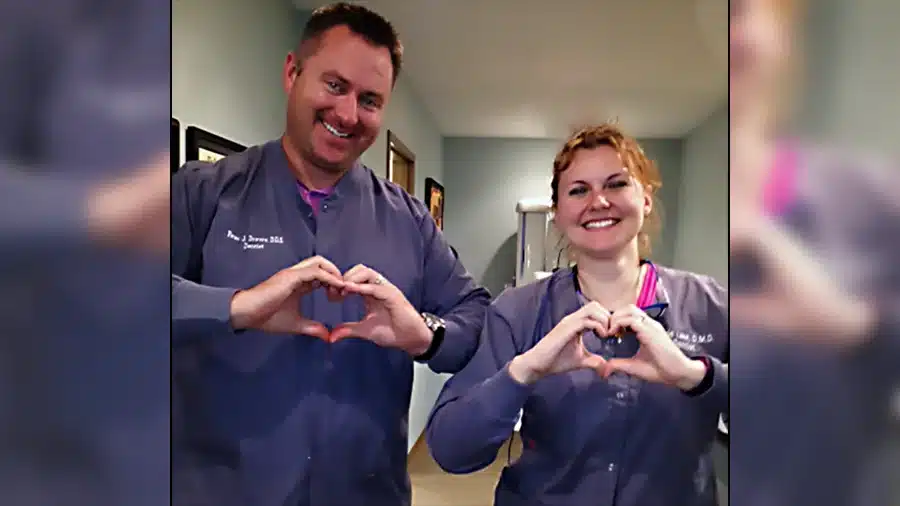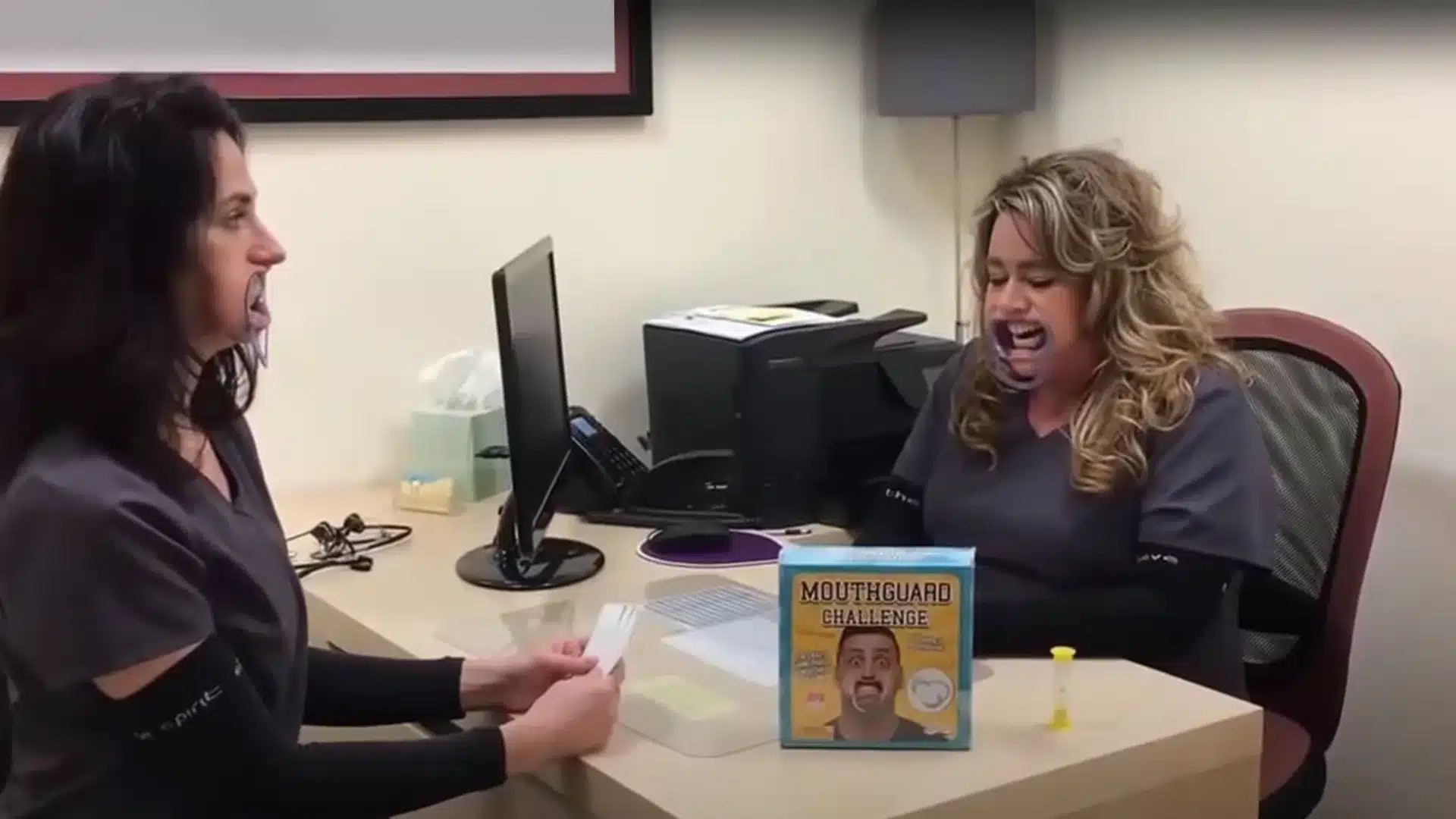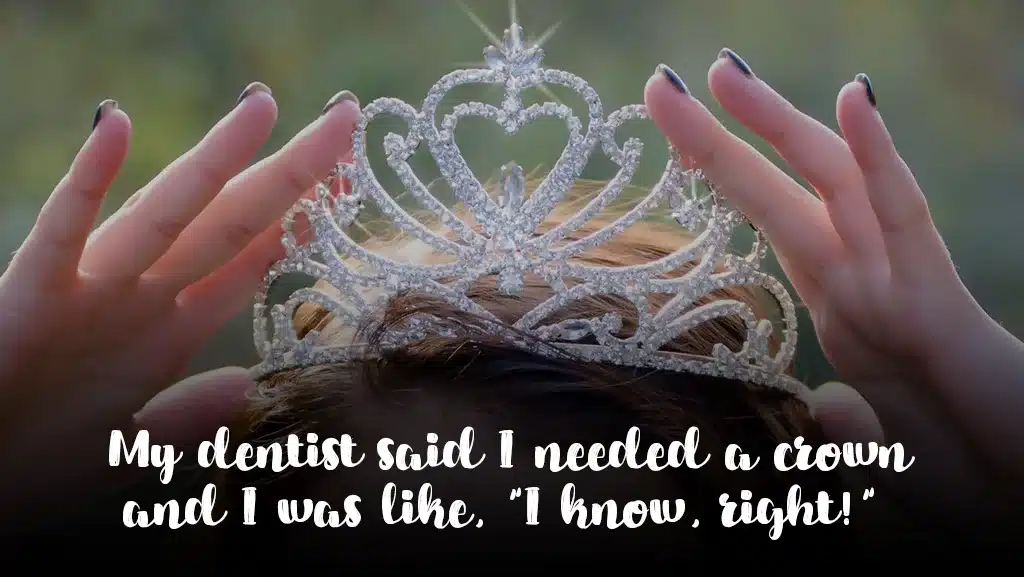Choosing any kind of local service provider, whether it’s the person who cuts your hair, works on your car, or is responsible for the management of your health, can be a daunting task. In any profession, there are individuals who are good at what they do and individuals who are, well, not as good at what they do. There are service providers with different personalities and attitudes, with different expertise in specialized areas, and with different degrees of dedication and ambition.
Searching for a dentist is not like rifling through online dating profiles where you are able to filter the results by a set of make-or-break criteria like looks, age, political preferences, and whether or not they have an unhealthy obsession with knitting.
Searching for a dentist is, however, a bit like finding the love of your life. It may seem like a pretty trivial task, but your relationship with your dentist is more important than you may realize. They are privy to all kinds of personal information, they will likely be seeing you at times when you are at your most vulnerable, and they are intimately aware of, and will be helping you make decisions about, your oral health.
Finding The Perfect Dentist
When you are searching for “the one who will be drilling in your mouth,” it’s important to have the right criteria for evaluating prospective dentists and arriving at, well, the love of your dental life.
1. Location, Location, Location
Over 95% of all dental office visits are by patients who live within 25 miles of the dentist, which is why most of us start searching for a new dentist, doctor, vet, etc. by Googling something like, “dentist near me” or “Lewiston dentist.” It’s definitely a good place to start your search, you want to be sure your dentist is easy to get to. Having your dentist close to home or work definitely helps. In an emergency, it’s always nice if the office is nearby.
You might also want to consider the actual office and whether it’s easy to get to and easy to get in and out of. How’s the drive? What’s the parking like? Is the office easily accessible?
Patients who move out of state typically find new local service providers in their surrounding zip code. Except for my loyal wife, who insisted on going back to Kentucky every 6 months, just so that she could see her hairdresser of ten years. Sometimes change is hard, especially when you’ve found a provider that you really trust. If you are careful in your search, you’ll find the right new dentist, just like my wife finally found a new hairdresser she loves and trusts.
NOTE: It’s worth going the extra mile for the right dentist, but you definitely don’t want to struggle in an emergency. If your beloved dentist is just too far away, it never hurts to ask if they happen to know any dentists in your area.
2. Licensed to Drill
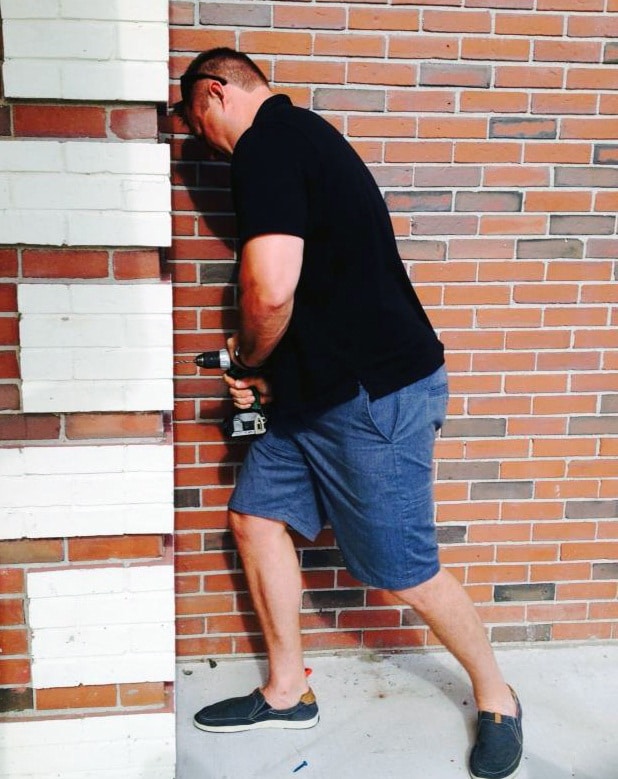
Once you’ve found a list of possible dentists in the right location, you want to verify they’re licensed to drill, a.k.a. actually eligible to practice dentistry.
There are obviously fixed models of training and techniques and dentists have DDS or DMD initials tagged onto their names (explained more in this post), but it can be confusing.
For checking certification, each state dental board provides specific data for every dentist practicing in that state including; how long they’ve been licensed, if there have ever been any disciplinary actions taken, if they have a permit for sedation or general anesthesia, what dental school they graduated from (and when), and whether or not they are board certified in one of the nine dental specialties.
For checking licensure in the state of Maine, visit this Regulatory Licensing & Permitting page of the maine.gov site. Check ‘ALL’ (under DEPARTMENT), ‘ALL’ (under AGENCY), and ‘DENTAL PRACTICE’ (under REGULATOR) and then you’ll be able to search by the dentist’s name.
At the most basic level, your dentist should also be a member of the American Dental Association (ada.org), which means they agree to abide by the ADA codes (the ADA Principles of Ethics and Code of Professional Conduct) as a condition of their membership.
It’s also a good sign if they’re active in their state dental association. Here in Maine that would be the Maine Dental Association (MEdental.org).
NOTE: You can use the “find a dentist” tool to search for an ADA member dentist near you.
3. Dedicated & Passionate
Measuring a dentist’s passion and dedication can be tough. While you can certainly try to ascertain if they seem to be excited about being a dentist during a consult, you can also measure dedication and passion by trying to determine whether they are up to date with new technology and trends in their field.

Does their website include information about the equipment and technology they use in the office? Are they actively sharing new skills on social media? Do they appear to genuinely enjoy what they do?
Dental boards recognize the importance of staying up-to-date and, as such, every practitioner must maintain a minimum number of Continuing Education (CE) hours every year just in order to keep their license. However, state requirements to maintain a dental license can be minimal, so it is important to try and determine whether a dentist is doing the bare essentials just to remain active in practice – or – if they are genuinely motivated to stay current in what is a very dynamic and constantly evolving profession.
NOTE: It’s okay to ask a potential dentist how much continuing education has been completed in the last 12 months. If they don’t like the question, keep looking.
4. Got Street Cred

Reputation is everything, right?!
So how do you really do a ‘background check’ on a dentist? Looking up their licensing info, creeping their Facebook and Instagram, and simply Googling them, is all a great start, but it doesn’t always give you everything you need to make an informed decision regarding clinical skills – although it might yield answers on that knitting issue I mentioned above.
Today’s street cred (a dentist’s reputation) is typically found by checking online reviews, looking for any legitimate complaints, and asking your friends and family.
There are so many places to see dentist reviews these days that it’s hard to keep up. Checking online patient reviews on places like Google, Yelp, and SuperPages will definitely provide helpful information, but keep in mind the 80/20 rule. The 80/20 rule tells you to be skeptical if you see 100% glowing reviews – no one can be that perfect all of the time (no matter how hard we try).
The same applies to very negative reviews, too. While negative reviews can definitely provide a lot of useful information on a product or service, I have also learned to be leery of ones which tend to have a lot of run on sentences, a liberal use of exclamation points, or just generally seem to be written by one of the George Costanza’s of the world. Poor George, some people are just never satisfied.
Of course, if you’re like my wife, you will read over 45 Amazon reviews before deciding what kind of tent to buy (for the record it was a Coleman, and the deciding factor hinged on the fact that it had a doggy door). And it looks like a lot of you are like my wife. This recent survey which asked 1,500 US respondents between the ages of 18 and 65 which dentist they’d pick based on a Google search that returns several options, showed 43.3% of all respondents indicated they’d choose the one with the best online reviews (52.2% of females between 55 and 64 years old indicated the one with the best online reviews). And in this other survey, based on 481 respondents, 86% of patients said they checked online reviews before choosing their last dentist.
Beyond online reviews, check the dentist’s reputation with the Better Business Bureau (BBB.org) to ensure that the dental office follows sound business practices and has positive references, even if it doesn’t have BBB accreditation. And you can also look at any local Chamber of Commerce information!
Perhaps the most useful gauge when vetting a new dentist is the reputation found right inside your own social circle. A significant portion of new patients (anywhere from 10% – 50%) are referred by friends or family members. The logic being that the people you relate to, and who share common interests, are more likely to have found the kind of person you would want for a dentist. This is one reason why match-making by friends and family is so common. It is also how I met my wife.
NOTE: Beyond online reviews, check the BBB, the Chamber of Commerce, and don’t forget to ask your family and friends.
5. Dental Roulette

It may seem like an odd strategy, but one thing to do in your quest to find a new dentist is to flip the script and pay attention to how the dentists are finding their patients.
Competition can be strong for your dental dollars in both big cities and smaller towns, so if you look at how a dentist goes about finding you, the patient, it can provide some insight into the type of practice they have.
Some dentists advertise heavily across all branches of media, while others are very social and are often seen at many local functions. Some teach part-time as a way to build their practice from contacts through academia, while others enjoy writing blog posts and participating in social media.
A dental office that takes a “Denny’s” approach to marketing; ‘dental special: do one crown, get the second half off’ is creating a different kind of brand, and likely targeting a quantity over quality.
Most of us have a preferred mixture of things we do to help build our practice, and most of us appreciate word-of-mouth referrals most of all. It means we’re doing a good job taking care of our patients. It is a huge pat on the back when a current patient recommends us to friends and family, but it is also rewarding when a new patient tells me they’ve visited our website and appreciated the time we take to maintain it.
NOTE: Look at how they’re looking for you and what information they’re putting out there.
6. “Money, Money, Money!”
Out here in the real world, cost is always a factor and cost is certainly a factor when selecting a dental provider. However, it is rarely the only factor, and should not be the only factor when choosing a dentist, either.
Patients with insurance often pick a dentist office that accepts their dental insurance or are in their insurance plan’s network. Some don’t even bother to consider service prices at all, and some never venture a look outside of a specific insurance provider list of doctors.
Patient A: “Who cares what it costs, the insurance company is paying. Let’s just go to this guy at the top of the insurance list.”
Patients without insurance will often ‘phone shop’ for dentists in search of the lowest fees.
Patient B: “I’m totally going to trust this guy with my smile, it’s the best price in town. You can’t go wrong with rock-bottom prices!”
While we understand and can appreciate the need to be frugal, we also hope that you understand you often get what you pay for, which can have long-term repercussions if it’s something that’s going in your mouth and/or treatment that affects your smile, your ability to talk, your ability to chew . . . Enough said.
NOTE: Cost is definitely a factor, it has to be, but it doesn’t have to be the only factor.
7. Nine-One-One, What’s Your Emergency?
How a dental office manages an emergency is also a consideration. It’s important that you are able to reach your provider after hours if your child gets a headbutt to the mouth by the rambunctious Labrador (yes, this happens), or you wake up on Sunday morning looking like a hamster stockpiling his breakfast in one cheek.
And while I feel it should go without saying, I’ll also mention that a dental office should be clean and tidy in all areas, desks, and work spaces. The clinical team should wear a mask, gloves, and a lab jacket. Be sure to ask about their sterilization procedures to ensure they are up to state code. You can find the requirements for dental sterilization procedures online here.
Update NOTE: We wrote that paragraph above years ago when we first published this article. We have always given Infection Control and Sterilization a priority for patient safety reasons, but in light of Covid-19, we’ve gone even further. Read more about how we are Practicing Dentistry during a Pandemic.
Where Everybody Knows Your Name . . .
BOTTOM LINE: There are so many different kinds of dental offices out there that there really is a perfect match for every kind of patient.
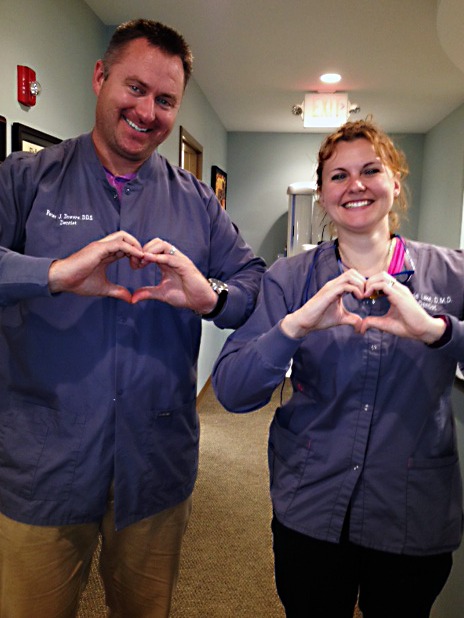
Realistically, the ideal dentist builds their practice by being understanding and doing the most conscientious work possible. Make an appointment and observe. Does everyone in the office treat you with respect? Do you feel like you were given time to ask questions? Did the dentist take time to explain things in a way that made sense to you?
I know that as a consumer, I want to be able to walk into a place of business and see the same familiar and friendly faces each time. It’s important that the space is clean and uncluttered, the providers are knowledgeable and informed, and that everyone who works there seems to enjoy what they do.
My wife would also add that there are extra brownie points if there’s a ‘shop dog’ (she recently went out of state and was in a bike shop where the owner’s dog was just hanging out, which was a huge store ‘marketing score’ for her). Obviously, we cant do that in a medical setting, which is why you may notice a lot of pictures of dogs just hanging out around the office.
If you live in Lewiston or Auburn, or any of the surrounding areas, and you’re considering Drews Dental, I’ll save you some of the research. Both Dr. Lake and I are members of the ADA, and we’re also both very active in the Maine Dental Association. We’re committed to the profession and are lifelong learners.
If you’re interested in learning more about our office or the team, taking a tour, finding out what insurance we accept, how many continuing education courses we have been to in the last few months, or just need a recommendation on the best place to get your dog groomed, give our office a call.



